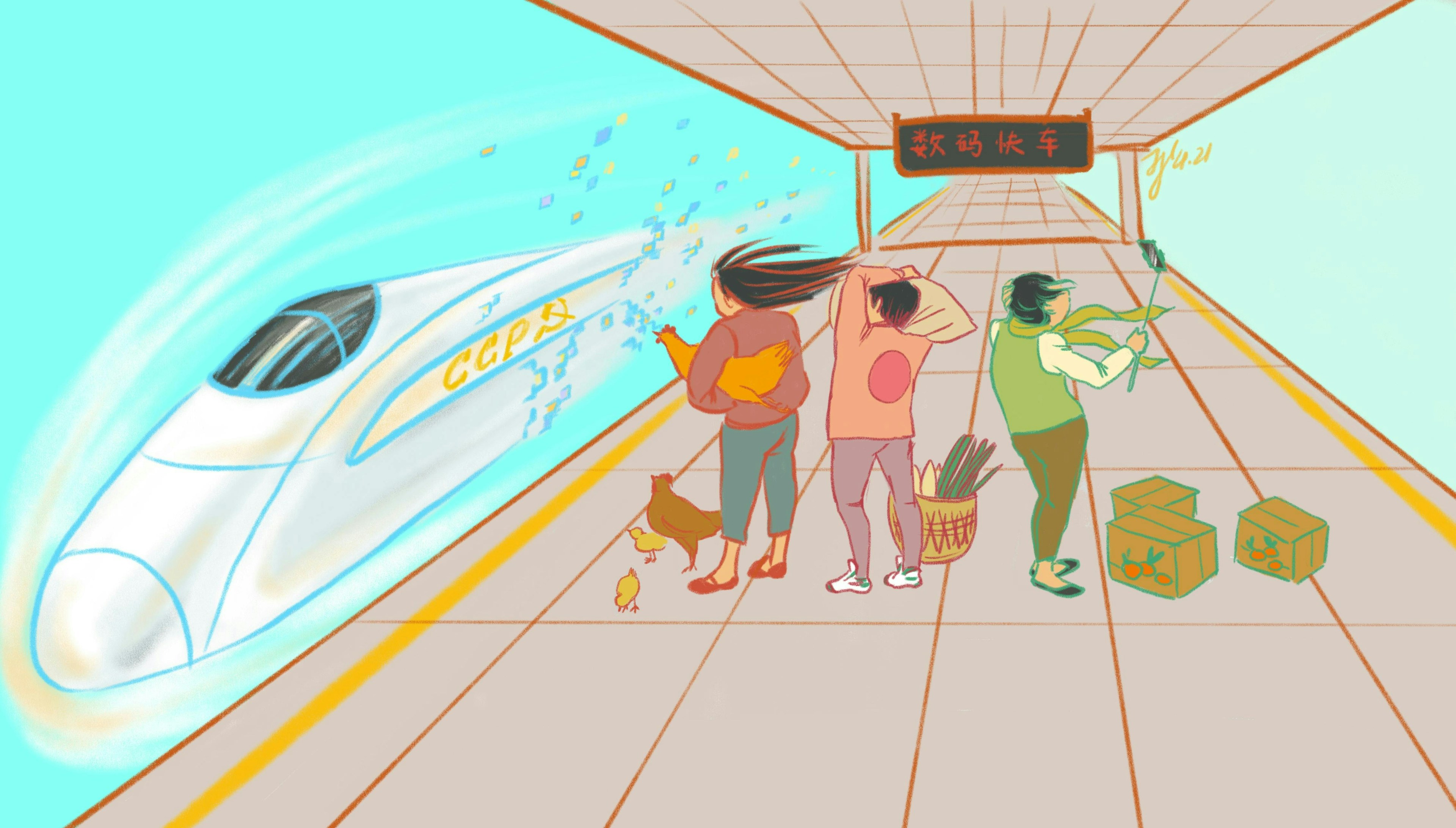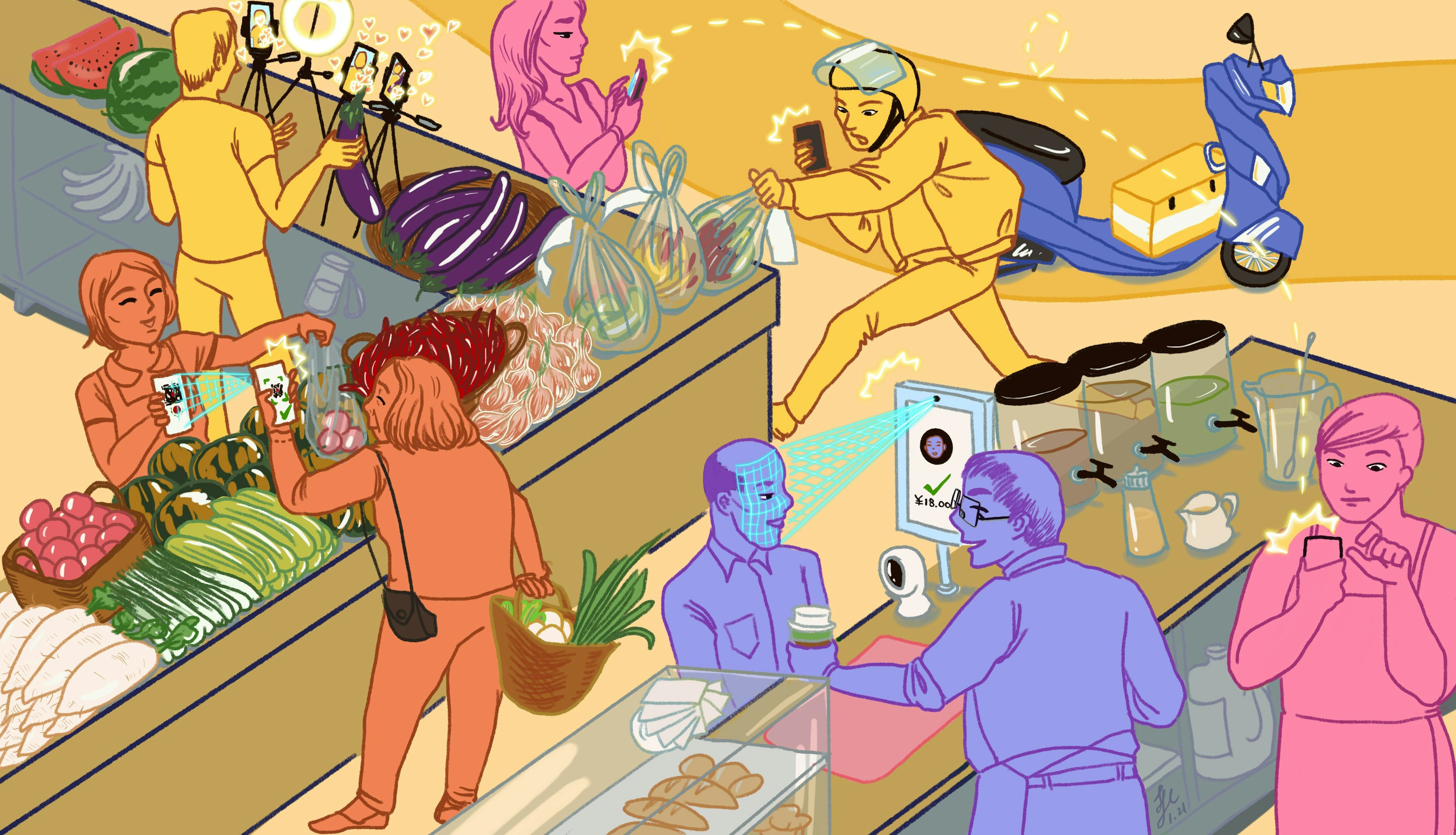Contemporary China negotiates with economies real and imagined

The first time I was asked to pay for something with my face, I was in the China-small city of Xuzhou (population: 8.577.225) in early 2019.
I was on a northern tour with a friend, having flown all the way up to Harbin in Heilongjiang province, bordering Russia, from Shanghai. We made our way back home by stopping at various northeastern cities for a couple nights each.
On our first night in Xuzhou, we had hot spicy noodle soup for dinner in the middle of a residential complex. When the shopkeeper said they didn’t have cold beer, I looked out the window, where a convenience store was conveniently located. I walked across the courtyard to pick up some Qingdaos.
At checkout, I pulled out my phone to flash my Alipay QR code—standard practice. The cashier shook her head.
“Look here,” she said, pointing to a blue box with an Alibaba logo, whose screen reflected my face at an unfortunate angle. It took a few seconds to grasp the purpose of the device, then inform her I did not have face payment set up and would like to stick to the old-school QR payment method.
Alipay and other Chinese tech firms had rolled out face payment around the country, though due largely to users’ privacy concerns, the practice has not taken off in the two years since. Despite reluctance to pay-by-smile, Chinese firms’ global lead in e-commerce is widely recognised.
Chinese companies dominate digital payments (Alipay and WeChat pay), online retail and food delivery (Taobao, JD.com, Meituan). And with live streaming/retail hybrids such as Douyin and Kuaishou, as well as Pinduoduo—an app that combines gaming and shopping incentives—people can purchase mundane goods like toilet paper and fruit.
Pinduoduo is unique in its particular and early emphasis on rural markets. The Wire China credits its success to this strategy and “its recognition that ‘developing China’ was an untapped, blue-ocean market opportunity.” Rural China is the only market poised to pull off the same kind of economic miracle that occurred in urban China after Deng Xiaoping’s 1980s reforms. As a source in the same article put it: “The next China is China.”
Pandemic notwithstanding, more of human life occurs online. But if firms fail to capture user interest, especially in the post-lockdown People’s Republic, consumers will still take their attention and disposable incomes to brick-and-mortar retail outlets. Online consumption is meant to be fun—so millions of users spend enough time on the platforms to eke out profitable data footprints. Attention is commodified.
real life > digitised life
The CCP supports tech firms’ rising prominence in Chinese life and society … to a point. As Dan Wang, researcher at Beijing-based Gavekal Dragonomics, wrote in his annual new year letter for 2020, “While promoting the status of science and technology with one hand, the Chinese government has with its other hand reined in the activities of consumer internet companies.”
These efforts include legislation aimed at digital security and other forms of regulation, like China’s draft Personal Information Protection Law, as well as the government-backed antitrust investigation into Alibaba founder Jack Ma, resulting in growing tension between government and industry.
Ma, like most tech entrepreneurs, likes taking risks. But regulators involved in tempering Alibaba’s market share, including Vice President Wang Qishan, favour stability over risk. In Xi’s China, someone like Jack Ma can see his stature shift from national icon, and recipient of state accolades—a modern embodiment of the Cultural Revolution’s token soldier Lei Feng—to a cautionary tale of what happens to Chinese businessmen who prioritise business growth over state interests: They will be stripped of billions of dollars, and coerced into isolation (Alibaba was fined $2.8 billion for antitrust violations in April of this year).
President Xi Jinping’s rejection of a unilateral approach to innovation that siloes technological advancement to the virtual realm (including his assertion that the “real economy is the foundation,” referenced in the Introduction to this series) is perhaps one of the most meaningful ways he helped China evade stagnation.
In the same speech from Qiushi, Xi writes, “As a large country with a population of 1,4 billion, the focus of the food and real economy industries must be on ourselves, and this point must not be abandoned.”
Pulling off China’s all-society response to COVID, for example, required a laudable ability to coordinate. Inspiration is prerequisite to achieving the (albeit imperfect and inconsistent) collectivism present in Chinese society. An inspired society is highly capable at scale.
State-led collectivism derives in part from the promise of a better tomorrow, a concept that veers dangerously close to the American dream. Contemporary American configurations that cling to the claim—that the U.S. somehow earned the right to dominance—are based on a stubbornly sanguine outlook on the role the country plays on the global stage. American values, adhered to with sufficient grit, are supposed to be the antidote to nearly any problem—no matter one's country of residence.
Given the growth China experienced over the last—take your pick on the number—years, a similar framework would provide a generous barometer. Still, the Party is uninterested in patting itself on the back; Chinese leadership is committed to keeping the engine running. Chinese parents believe their children can have a better life than they did.
Taking at face value that the CCP prioritises the “real” economy and innovation over market share dominance in digital services such as mobile payments, it is unclear exactly how much economic or innovative leeway tech companies and individuals operating in this environment really have. Is participating in a Taobao village considered innovative? What about the farmer peddling her wares via livestream?
Is it possible to perceive, and thus safely navigate, government-accepted boundaries of invention and profit?

Mind the gap
Rural China: home of the hustlers, land of the livestreamers
“All comrades must aim high and look far, be alert to dangers even in times of calm, have the courage to pursue reform and break new ground, and never become hardened to change or inactive,” President Xi Jinping wrote in a 2017 report, given at the 19th CPC National Congress, the same forum that launched China’s Rural Revitalisation project.
Through livestreaming, Chinese farmers are elevating transparency in agricultural practices and increasing consumer trust—and interest—in the process. Would you rather buy potatoes from a farmer who walked you through her cultivation process, and provided a tour of her sun-soaked fields, or from anonymous grocery store aisles? Even if you aren’t curious about a potato’s backstory, livestreamed agricultural content is as interesting as any other video an urbanite might stumble upon on the metro ride home. Regardless of whether viewers follow up by buying potatoes, the livestreaming farmer makes a profit via eyeballs. Meanwhile, top livestreamers who promote rural e-commerce from faraway cities are rewarded; billionaire livestreamer Viya was granted a National Poverty Alleviation Award last year for using her platform to sell agricultural products.
About 40 percent of China's total population live in the countryside, and e-commerce has enabled rural villagers to sell local products, artisanal crafts, and manufactured goods, with help from digital store-opening platforms like those that Jack Ma's Alibaba Group provides. "Taobao villages" have proliferated as a result: A Taobao village is defined as a village where at least 10 percent of households are engaged in e-commerce businesses, and the village’s total annual e-commerce transaction amount is at least RMB10 million ($1.6 million). These villages alone yielded $195 billion in e-commerce sales in 2018, outpacing growth in China's overall e-commerce market.
Attention, and its cousin boredom, are partially responsible for the monumental boost that China’s livestreaming farmers enjoyed in 2020. The pandemic stimulated a huge increase of interest in agricultural livestreaming, when people were stuck at home and discouraged from going out to buy food. Oftentimes partnering with JD and Alibaba, farmers jumped on the opportunity to increase sales, even if it meant livestreaming for the first time.
Xi is calling for people to become as adaptable as the Party has proven itself to be. The less you have to lose, the easier it is to adapt, and to assume the labour and psychological energy cost of doing so. In recent years, possibilities have expanded for rural Chinese who stay in the countryside. Migrant life in China’s big cities is less alluring due to untenable rent prices and a sense of displacement. Concurrently, opportunities in the countryside are developing in response to government attention and investment, as well as individual innovation, two sides of the semi-free market coin present in the PRC’s economic landscape.
The Xi Jinping brand—both the man and the Thought—have a discernible obsession with temporal rhetoric. He draws upon history and the past as often as the great changes and turning tides of the future, largely to reflect power shifts from West to East. Xi also capitalises on this jargon to explain away CCP policies or actions that appear to be in conflict.
“Throughout human history,” Xi said in a 2018 speech, “the development of the world has always been the result of contradictions intertwining and interacting with each other.” In imagining rural futures, comfort with contradiction is handy. Following this framework, a virtual economic transaction is as real as an in-person one, since “realness” is evaluated on the basis of the material world—the ends—rather than the means. Potatoes purchased with a face, or a few taps on an iPhone, are as real as those purchased in a market. Both options are ideal, if they yield more potato purchases.
Xi Jinping’s Thought on Socialism with Chinese Characteristics for a New Era captures the mood of Xi’s China in early 2021: It faces a dual mandate to remind Chinese and foreigners alike of China’s historical predominance, and leverage an underdog designation, to inspire wins in the ongoing competition between China and other nations in science and technology.
Achieving this leadership role requires both physical and digital development. In China, these processes occur simultaneously, if not evenly, in both rural and urban areas. Super-modern megacities are outdoing themselves, and by many measures, western peers, while rural areas achieve foundational benchmarks in provincial GDP (despite somewhat problematic growth targets) with help fromgovernment actions and civil society efforts such as Alibaba’s Taobao village project.
China’s Rural Revitalisation strategy lends itself well to achieving multiple domestic policy goals simultaneously: Strengthening social stability by providing expanded employment options, enhancing scientific and technological development, and encouraging rural youth to stay in villages, so the country has sufficient farmers to produce the necessary crops to ensure long-term food security. Win-win-win.

Precarious hierarchies of need
Ecommerce: ripple effects on human interaction
In a presentation titled “Restoring ‘place’ in the modern market—stories of a Chinese e-commerce village,” given at the 2018 interaction conference in Lyon, France, Alice Fang made the case for considering the significance of physical place in market dynamics. She argued that e-commerce, although limited and distinct from typical interactions facilitated by traditional markets, traverses boundaries between people and places in new ways.
She references China’s two main ancient markets (West Market and East Market), located in the ancient capital of Chang’an. These markets were so central to life and interaction that the Mandarin word for “thing” (东西 dongxi, literally “east west”) derives from a reference to them.
Fang recounted visits to physical markets in China (a hair market in Guangzhou for African clientele, an electronics market in Shenzhen, and the marriage market in Shanghai’s People’s Park) and described a “long tradition of markets and place being tightly interwoven.”
Using the example of a small Taobao village, Fang observed that e-commerce creates new place-based forms of human-human interaction. And it is social networks, person-person connections, that make villagewide e-commerce ventures possible. Even if consumer and seller do not meet, others meet and exchange knowledge as a result of the buyer-buyee transaction.
Despite their comfort with taking on the role of merchants, sociologist Zhang Wenxiao argues that rural populations in China are often skeptical of shopping online themselves. “Rural consumers, especially farmers, also place greater emphasis on interactivity and the sensory experience of buying things in-person than their urban counterparts,” she writes.
The desire to interact with a product, and/or people selling it, before buying, is by no means limited to Chinese farmers. We have all bought sweaters on the basis of texture—imperceptible online. But there is a specific appeal to online shopping, the adrenaline of convenience and control: you are the overlord of the shopping cart; you can pay extra for next-day delivery and the item will likely be delivered the next day. This is an almost sci-fi-esque form of point-and-click control.
Like other addictions, shopping provides a burst of excitement that breaks daily monotony and makes us feel part of something larger than ourselves—even if that something is simply a cog in the logistics of the global economy. In an increasingly globalised yet isolated world, online shopping packs a particularly strong punch; the sensation that you’re master of your universe may supersede symptoms of loneliness.
For now, there is diversity in official and corporate imaginings of rural Chinese futures. Companies like Alibaba implement technology to meet prized state economic imperatives, especially in agriculture. But the degree to which optimised life will be embraced by rural Chinese remains unclear. “One farmer told me the future is a created concept,” Xiaowei Wang writes in Blockchain Chicken Farm, “and that in the fields, in the long dark of winters, there is no future, because every day depends on tending to the present moment.”
Narratives of Chinese futurity
The Economist uses the following descriptors to characterise China’s e-commerce landscape: “effervescent,” “fierce,” “dynamic,” “Wild West climate,” “brutal Communist Party power,” “a cornucopia,” “creative,” and a blend of “e-commerce, social media and razzmatazz.” It is one of many that depicts China’s success in tech fields as exciting, futuristic, and fear-inducing, casting China as a formidable yet competent competitor—a frame of Sino-Western relations that has received plenty of screen time.
Persistently pairing the PRC with the future may ironically keep China from participating in the western industrial tech market present. Sinofuturism draws upon the temporal exclusion established in orientalism, but carries the added bonus of looking like a compliment: “Sinofuturism is a reverse orientalism—an orientalism operating its denial of coevalness through the attribution of futurity,” writes media anthropologist Gabriele de Seta. It separates China from other nations invited to the party, discourse, and decision-making of the present.
This is not new. In the mid-2010’s, “China and its people were portrayed as an opportunity to go back in time, to return to a period before the feminisation of the tech and creative industries took hold in the West,” Silvia Lindtner writes in Prototype Nation: China and the Contested Promise of Innovation, describing the optimistic media narrative that emerged covering Shenzhen’s potential role as complement to Silicon Valley—a hardware hub, and second centre of innovation. That “new” China, Lindtner writes, was exciting because of its otherness.
For its part, CCP leadership has employed similarly extreme, if tonally distinct, language to describe its technology future. In anticipation of the recently-released 14th five-year plan, Premier Li Keqiang described the “digital China” portion (translation by DigiChina available here). His language borders on impenetrably niche when he asserts that China will:
Perfect the national innovation system ... perfect science and technology innovation systems and mechanisms, and expand society-wide national research and development expenditures by at least 7 percent per year ... Accelerate digitised development, forge new digital economy advantages, cooperate to push forward digital industrialisation and industrial digitisation transformations, accelerate the pace of digital society construction, raise the level of digital government construction, construct a good digital ecosystem, and build a digital China.
Another semi-Sinofuturist narrative is familiar and popular amongst foreigners who spent time in China. It is what Wang in Blockchain Chicken aptly calls “the seduction of contradiction,” attributing its use primarily to western writers—people who, like myself, are transfixed by the experience of getting dinner and a beer for $2,50 and paying with their faces. Wang writes: “They conjure images of modern, gleaming skyscrapers alongside ramshackle food stalls, the chaos of crowds tracked by surveillance cameras, the steam from a wok reflecting the blue light of an iPhone.”
These images, however striking and earnest, often come with a disturbing helping of exoticism—which those who lived in China should know better than to fall back on. Such othering, conscious or not, stems from an outdated but lingering western understanding of development: industrial revolution; then, middle class lifestyles and suburbia; finally, a whole nation wrapped in the sweet embrace of Silicon Valley and sleek, stable satisfaction. No more big changes.
aftershocks
The American writer and futurist Alvin Toffler defined the title phrase of his 1970 book Future Shock as “a time phenomenon, a product of the greatly accelerated rate of change in society. It arises from the superimposition of a new culture on an old one. It is culture shock in one's own society.” Coping with future shock requires confronting forces beyond you—boundaries that distinguish you from those you know, and those you know from the country you belong to.
“The kind of future shock that Toffler was focused on in the 1970s is relevant if you’re a middle class white guy in America,” the writer and producer Samantha Culp—who spent a decade living in China, and who recently published an article on Future Shock—said in an interview. Possible futures in store for rural China may come with significantly less angst: “The shock of suddenly having clean water, for example, is a future shock everyone can live with."
By the time most Westerners are hip to the fact that China has cultivated a new economic infrastructure—physically and digitally—they will likely be excluded. Instead of attempting to predict, and fearing the future, we might as well embrace the fact that linear timelines cannot accurately describe globalised markets, let alone societies. As parallel development timelines accelerate into the globalised 2020s, China is already on board with this new reality, even as the West struggles to picture it without leaning on hysteria or exoticisation.
“In China today, for many people across generations who have experienced these rapid changes unfolding in their own lives, the perception is understandably that: Change is happening and keeps happening,” Culp said. “While it is volatile, you can ride it if you’re clever.”
11 Jun 2021
-
Johanna Costigan
Illustrations by Frankie Huang.
DATA-DRIVEN TECH & SOCIAL TRENDS. DISCOVERED WEEKLY. DELIVERED TO YOUR INBOX.
02/03
Related Insights
03/03
L’Atelier is a data intelligence company based in Paris.
We use advanced machine learning and generative AI to identify emerging technologies and analyse their impact on countries, companies, and capital.


